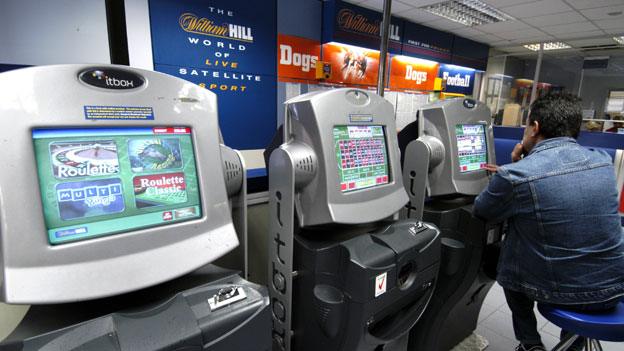Glasgow gamblers bet £200m a year on bookies' fixed odds machines
- Published

Players typically stake £12 a spin on roulette and other casino games in betting shops
Gamblers in Glasgow bookmakers are staking more than £200m a year on controversial fixed odds betting terminals (FOBTs), an investigation has revealed.
More than £500,000 is ploughed into around 800 machines in just over 200 betting shops every day.
Players typically stake £12 a spin on roulette and other casino games.
Now a council report has called for tougher regulations to tackle problem gambling.
Glasgow's city treasurer, Councillor Paul Rooney, believes the city is paying a huge price - financially, socially and in public health - because rules on bookmakers are not tough enough.
He said: "I'm not against gambling, but the industry is regulated for a reason.
"It is to ensure that when gambling takes place in our communities it is within a safe, sustainable and responsible environment.
"In the case of fixed odds betting terminals, that principle has failed."
Stakes on FOBTs can be as high as £100 and more than of 5% of bets made in Glasgow risk £50 and over.
Large prizes
City gamblers' losses are now estimated to be £31m a year.
Across the UK, bookmakers take around £1.5bn a year from FOBTs - more than from horse racing, dog racing and football betting combined.
Industry insiders admit around 5% of customers are likely to have some form of gambling problem, with these gamblers responsible for a disproportionately high level of bookmakers' profits.
The Glasgow report, believed to be the first of its kind in Britain, stops short of demanding FOBTs be outlawed.
But it calls for detailed independent research to establish the impact of allowing casino-style gambling on the high street.
And it wants regulators to be forced to act on its findings.
Mr Rooney added: "More than a dozen years after machines appeared on our high streets, neither the industry nor its regulators are able to identify to what extent - if any - the intense speed of play, ability to win large prizes with relatively low stakes, and the opportunity to increase stakes rapidly influences problem gambling.
"We want Scottish government ministers to give us the same power that councils in England and Wales will soon have to halt the clustering of betting shops in high streets and town centres.
"And the industry needs to take some very big and potentially difficult decisions if it expects its self-exclusion policies to be taken seriously."
Bookmakers have described the report as "flawed".
Graham Weir, Ladbrokes head of problem gambling, said: "I don't see the machines as being a significant problem compared to any other gaming or betting product.

Bookmakers say the report is flawed and that there is no evidence customers using FOBTs have gambling problems
"The vast majority of our customers play machines and enjoy the experience safely.
"They don't lose large sums and they don't have a problem with their gambling.
"About 60% of machine sessions last five minutes and on average customers will spend £12 in the sessions."
He added: "All things are relative. Someone could place a £20 bet on England going through to the next round of the World Cup and they can do that over the counter in a second.
"At Ladbrokes we encourage all our customers to set their own limits so they can stay in control."
He said that before customers begin playing they pre-determine how much or how long they want to play that machine for.
"The majority of customers who set their own limit then leave that machine as soon as their limit warning is displayed to them," Mr Weir added.
"People who can't engage safely with products shouldn't be in betting shops.
Potential problems
"We will support any customer who admits to us that he has a problem and our shop teams are trained to help identify people who have potential problems and help them to help themselves.
"Some of those measures include self-exclusion."
He said: "During my discussions with the council it was put to me that betting shops will place their shops next to payday lenders and that is absolutely not the case.
"If someone chooses to place themselves next to one of our shops, then that is a problem for Glasgow city council to address."
A spokesman for William Hill said: "William Hill co-operated fully with the Glasgow sounding board report.
"We provided clear evidence of our strong commitment to responsible gambling and the robust processes we have in this area.
"The board also received clear evidence that there was no direct association between payday lenders and betting shops and we are surprised at what appear to be a number of foregone conclusions in a flawed report."
- Published30 April 2014

- Published18 June 2013
